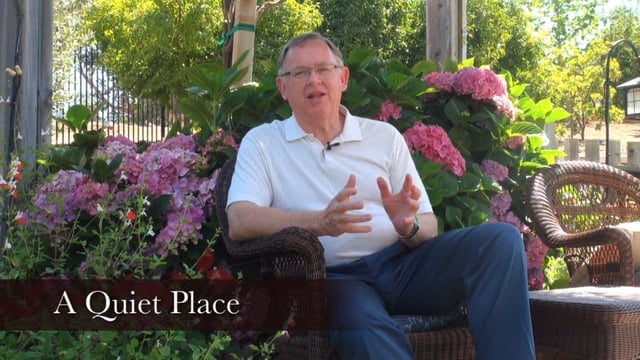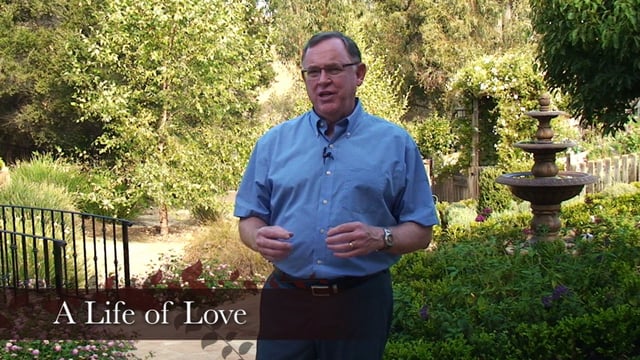By Wayne Jacobsen
Living Loved • Autumn 2011
They are all over the world. I’ve met them everywhere–men and women who have been seasoned with the joy of living loved and are capable in the simplest of conversations to encourage others along that journey as well.
You can sit in their homes and be at rest, knowing you are cared for–not because of what they want out of you, but simply because you are one of God’s kids. They live quiet lives, neither pressed by their responsibilities. nor engaged in self-promotion or the advancement of their personal agenda. They do not manipulate others to get what they want. You never have to guess what they are thinking. They are honest with others, but gently so, and patient with those who struggle.
These are the things living loved wins in the human heart over a significant period of time. These are not principles to live by, or traits to emulate. They cannot be faked. The weight of words of people like this rises out of the depth of their character. They don’t play to the spotlight, but give their lives freely to others as God leads them.
I am often asked what other authors or books have shaped my thinking. I can list many because I am a reader. But that which has most shaped my life has not come from books. It’s come from people, just like those I described above, whom I’ve had the opportunity to walk beside for various seasons of my life.
The people I know who have the most impact on the planet are people who live quiet lives of profound significance. That significance isn’t measured by book sales or followers, but by the free sharing of their lives in face-to-face engagements. Few of these have ever written a book or host a website or podcast. They are not clamoring for the stage, nor do they bask in the adulation of others. Their one overriding passion is to enjoy God as their Father, and to help others find that joy as well.
Elders
These are in the truest biblical sense of the word, elders. There, I’ve said it even as I know the term itself will grate on many. It’s an awkward word in our day. Our society doesn’t use it much any more, at least in respectful tones. We may use it of the elderly, but only when we talk about caring for them.
Congregations use it to denote those who manage the affairs of the corporation, making the weighty decisions, and sometimes demanding to be honored by those not so anointed (or educated, or well-heeled). One of the things I noted late in my last pastorate was that those who most wanted the position of ‘eldership,’ weren’t really elders–at least not as the Bible describes them. And those who most demonstrated the maturity and compassion of an elder refused the position when we offered it to them. That confused me at the time, when it probably should have educated me.
When Paul wrote to Timothy and Titus, it was clear he saw elders as a very different reality than what the title conveys to us today. In fact, he didn’t see it as a title or position at all. It was the reality of one’s relationship with Jesus–won on the painful battlefield of human experience and resulting in a life filled with God’s wisdom and a deep compassion for those who struggle. They weren’t elders of an institution, but simply older (not necessarily in age) brothers and sisters who could easily encourage others on their journey.
Even at the end of the New Testament we discover that not all those who called themselves elders were true elders. Some, who were regarded as elders for a season didn’t continue to live in that reality. Others became puffed up in their desire to have first place in the body–a place reserved for Jesus alone. Those who lorded over others were roundly rebuked. Those who pushed others into unsound doctrine were openly exposed. And those who led people after their own desires were confronted.
But just because the term ‘elder’ has been misused, doesn’t mean that there aren’t true elders among us today and a crying need for many more. These are not people you’d want to hide from, but those you’d want to be near because they bring such wisdom and encouragement to our own journeys.
What it takes to help others live loved is one of the most engaging conversations I have of late as I travel around the world. When people are settled enough in their own journey of living loved by the Father, they want to know how they can help others to a similar journey. I hope to do more retreats like this in the future, so those with the passion to help others live loved won’t fall victim to old methodologies, which simply can’t work in this environment. It might be helpful for us to rethink what elders are in this family.
Looking In the Wrong Places
Today those who pretend to lead in the body of Christ, or speak for her in the world, do so by power of their influence measured in a position, congregational size, book sales, celebrity status, or academic pedigree. Just because someone can write a good story, or hold a crowd spellbound with a word or a song, does not mean they are living out the truths they talk and sing about. I meet many people who seem to understand the theology of God’s love and grace, but cannot seem to live it out practically. It is still only a conviction in their intellect–not a rising reality in their heart.
God has put the biggest and deepest treasures in the smallest places. I’m convinced of it. Our world, even the so-called Christian world, values all the wrong things–money, fame, success, scale and influence. We think those whom our media interviews as spokespeople for Jesus must be more spiritual, more favored, or are being rewarded for something good they must have done. Nothing is further from the truth.
When we value what the world values we can be pretty sure we’ve lost our perspective. Jesus confronted the Pharisees for their love of money and position over people. “What people value highly is detestable in God’s sight.” (Luke 16:14) He wanted us to know that doing things to be admired by others and manipulating people after our own programs or agendas not only distorts the treasure he has put in us but it also destroys the treasure he put in them.
Every month I meet people who want to be famous for their writing, their teaching, their music, or their art. Their frustrations fill my inbox every week as they fight to serve their need for significance even as they deny doing so. I know what it feels like. In the early days of this journey I remember lamenting, “I never had so much to share and so few people to share it with.” Now I know that this season was inviting me into living the truth instead of just teaching it, and sharing it in personal conversations rather than in lectures and articles. Living out the truth there is so much more fun and far more effective.
Reality television has introduced hoards of new people to celebrity status and has become the coveted ring for so many carousel riders who stretch from the up and down beat of their fake horses hoping they can find their way into the spotlight. It is an obsession and it runs askew of what Jesus taught us. Yet so many people end up falling off their horse never realizing it was God’s mercy that protected them.
Amongst all those searching for celebrity or trying to push movements, I want to put another voice into the consciousness of the community or believers: The people I know who most profoundly affect kingdom culture around the world aren’t often known broadly beyond the local people their lives touch, and yet surprisingly they have connections all over the world as the Spirit has linked men and women of common ilk together.
If you want to know what true eldership is, consider their way of life. This is what I see in those who have allowed Jesus to shape them so that they can encourage others in living loved.
Authentic Lives
My last four years living in the shadow of The Shack has only confirmed my convictions. The more “known” someone becomes, the less impact they have on individual lives. People view them as something other than what they really are, and put them at a distance. There is nothing about my growing notoriety from my involvement with that book that made doing what Jesus has asked me to do in the earth any easier. Image always distorts reality.
Didn’t we all learn early on that if you wanted people to like you, you had to conform to their expectations? That’s how we became so skilled at pretending so we’d be approved by “the right kind of people.” Life in Jesus untwists that in a beautiful way. The more you live loved the more comfortable you become with who you are and with the process of God’s work in you. You no longer feel the need to impress others and you certainly know there’s no value in others pretending around you.
So while they are not perfect and won’t pretend to be, people who live in love are honest to the core. They are at peace with God’s process of transformation, knowing he has done wonderful things in them, and yet, they are fully aware that his work is not done. They are honest in weakness and the same people in private as they project in public.
So they are compassionate with the journeys of others even as they demonstrate a vast integrity in their own lives. They are true to their friendships and faithful to their word even when it creates greater hardship than they knew at the time. They don’t seek to be in control of events around them because they’ve learned to trust God’s purposes in their unfolding circumstances.
And because they are at ease with themselves, they set other people at ease around them. They don’t withdraw or get defensive or angry when challenged. They will let you notice what you need to notice, question what you need to question, and be honest about your own struggles and doubts without feeling diminished. They know loving someone and agreeing with them are two very different things.
Horizontal Friendships
Those who are learning the joy of living loved by the Father realize that love transmits in twos and threes and the kingdom grows by loving the next person that crosses your path, not by becoming another loud voice on an overcrowded stage. They serve in the simplest of places–at home caring for young children or infirm parents. They offer a shoulder to a distraught stranger, or an evening of conversation with a struggling pilgrim. They live in huts and homes in far off lands loving the people God has put near them.
They will have a number of healthy relationships around them, including with their spouse and children. They are not perfect relationships, but they are healthy with mutual respect and affection. That doesn’t mean everyone likes them, of course. They can be threatening to those whose agenda runs counter to their simple approach to God’s love.
They won’t seek to control or force others into a group or program. They have a heart for the unity of the whole body and resist being drawn into “us versus them” conversations, whether it is over matters of doctrine or church styles. They’re not looking for another strategy to change the world, nor ways to make people dependent on them or their gifts. They simply enjoy helping others learn to trust Father more, knowing as people learn to live in that reality Jesus will put his church together in amazing ways.
They live alongside people always avoiding the pretense of being above them. They don’t seek to be “leaders” in any traditional sense, because they know they can have far better input as your brother or sister than by being put into some kind of false leadership box. They are not looking to be spiritual mentors or fathers; they simply want to be accessible to help others discover the joy of their own relationship with the Father.
Being this kind of person is not a matter of learning a new theology or ministry technique. Unfortunately there are many who teach a theology of love or a message of grace who don’t yet understand how to live it in their own relationship with God or with others. They are still looking for a name, a following, or a ministry for themselves. They have a meeting for you to attend, a program for you to follow, or a book for you to buy.
False elders will often demand that you trust them or commit to their program, and not care for you beyond how you benefit them. If you challenge them, or ask a difficult question they will get defensive and angry. They have to be the expert–always above you and wanting you to serve them or their vision. If you stop serving them, they will reject you and will seek to destroy your reputation by calling you bitter or rebellious.
Not even the Holy Spirit acts that way. Jesus called him the ‘Paraclete’– or, ‘the one who is called alongside to help.’ If anyone had the place to take authority over us and command our obedience, it would be him. But the Spirit comes alongside to help us in our growing journey with Father. He never demands and never pushes. He gently asks the questions or makes the observations that have the potential to open our hearts in a greater way to the Father. If we choose to walk away from that, he will still come with us in hopes that we will yet turn our hearts his way.
Hospitable Hearts
In former days if you wanted to help people live loved you had to pastor a church or be a missionary. In more recent days you have to start a ministry by writing a book, forming a house church, or doing a podcast and trying to find a way to promote it. Real ministry alongside people, however, grows more organically than that–and if it doesn’t, it will destroy you in the end.
This isn’t about using other people for your purposes, but helping others just because you care about them. Certainly I wouldn’t discourage people who feel they have something to share at a wider level that will encourage others. By all means, write and podcast and do whatever God has put on your heart, but realize that the best way to encourage and equip others on this journey doesn’t come by strategizing your next project, but by following the nudgings he puts on your heart. That will mostly involve loving the next person he puts before you. When I travel the most significant moments don’t happen when I’m in front of a roomful of people. They happen in conversations during breaks, over meals, and in the homes that invite me to stay.
That’s why Paul listed hospitality as one of those critical attributes of an elder. In the old system, hospitality was never crucial. Finding my place in a program and getting others to do the same doesn’t require hospitality. Even organizing a class or seminar doesn’t demand that. That may be why we were comfortable in the old programs, because someone else set the times and places, all we had to do was show up.
But if real encouragement happens in twos and threes, across tables and sitting on back patios, then hospitality is critical. Opening my heart as well as my home puts me in the kinds of conversations where real life is conveyed. If you want to help others on this journey let Father cultivate in you an open heart and an open home. Make room for others. Take the initiative in inviting people into your life and in facilitating connections with other people.
What Love Wins
Authentic lives, horizontal friendships, and hospitable hearts are what love wins in us. If you want to help others live in the reality of God’s love, let him shape these things in you. Don’t force them to happen. Just know that the more secure you become in his affection, the freer you’ll be to love others in a way that will bring life and transformation to them.
I didn’t write this article so that you would go out and seek an elder to follow. They wouldn’t let you follow them anyway. I wrote it to encourage the conversation of what eldership really is, so you won’t be manipulated by anyone under the guise of their so-called leadership mantle. If they are not helping you follow Jesus, even when you make mistakes, they are not elders in his kingdom. If they are not encouraging you to greater trust in Jesus’ ability to manage your life, don’t listen to them.
Furthermore, I want to encourage those who do have a heart to help others learn to live loved. How do you do that? By learning to live in his love yourself. If you want to grow in these freedoms, simply let him teach you how to rely more on his love each day–that will transform everything about the way you live.
And for those learning to live in the Father’s love, I want to encourage you to make yourself available to those around you–not by starting a ministry, but by simply engaging friendships with people as God makes connections. When someone is on your heart, seek him or her out. Spend time with them and see where God takes it. Look for ways to encourage their journey.
It’s not the loud lives that have consequence in the world, but those who live behind the scenes loving those God puts before them. You’ll notice they don’t need to form a group and get people in it to have impact. Just being with people is enough. Jesus never created an environment and invited others into it. He joined people in the environments they were already in and by loving them there they were changed, sinners as well as believers.
If enough of us do that, all that God wants to accomplish in the world will be done.
Download Article:
- Download Article PDF (106 KB)
- Download Readable Newsletter (749 KB)
- Download Printable Newsletter (714 KB)
Living Loved is published periodically by Lifestream Ministries and is sent free of charge to anyone who requests it. For those with email we recommend our web-based version so that we can hold down costs and get it to you much more quickly. This is especially important for international subscribers.
© Copyright 2013 Lifestream Ministries
Permission is hereby granted to anyone wishing to make copies for free distribution.








